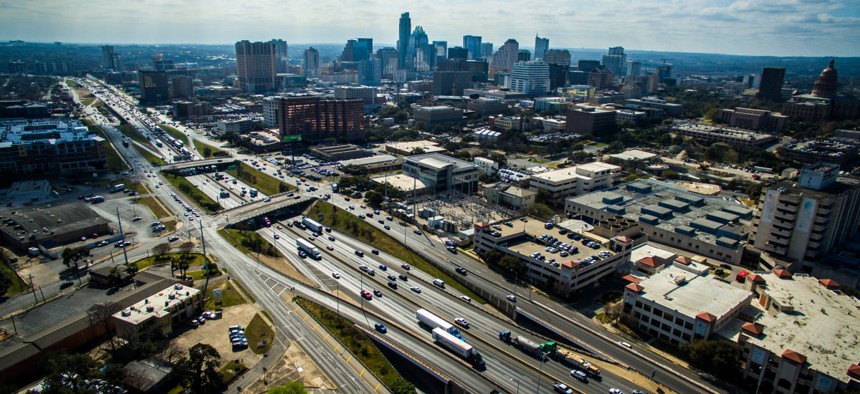Eying $50 Million in Transportation Funding, Austin Officials Tie Mobility to Equity

Interstate 35 passes through Austin, Texas Shutterstock
“Choosing to do nothing is choosing to watch the city that we love die slowly in an ever-expanding traffic jam,” Mayor Steve Adler said Monday.
Austin city officials on Monday linked concerns over affordability and economic equality in the Texas capital to shortcomings with the transportation network there, as they outlined the city’s attempt to vie for up to $50 million in transportation funding through a federal competition.
“Mobility in this city is a life and death issue for us,” Mayor Steve Adler said at a morning news conference. “So is affordability. And this is a challenge that will enable us to address both.”
Adler was referring to the U.S. Department of Transportation’s Smart City Challenge, which launched last December. The winning city will be awarded as much as $40 million from the Transportation Department to help pay for cutting-edge projects that make transportation safer, easier and more reliable. The winner will also be eligible for up to $10 million in additional funding from Seattle-based Vulcan Inc., an investment firm started by Microsoft co-founder Paul G. Allen.
The idea with the challenge is that the winning city will act as a testing-bed of sorts for innovative transportation projects and technology, which can later be replicated around the U.S.
Nearly 80 cities initially applied for the grant money. Transportation Secretary Anthony Foxx announced seven finalists in March, including Austin. The others are Columbus, Ohio; Denver; Kansas City, Missouri; Pittsburgh; Portland, Oregon; and San Francisco.
According to Austin’s director of transportation, Robert Spillar, the city’s proposal includes initiatives focused on: automated and connected vehicle technology; electrifying the city’s fleet; intelligent, sensor-based infrastructure that can collect data and communicate with vehicles; creating regional transportation hubs; and what Spillar called “packaged mobility services,” which will be geared toward providing ways for people to use a single card, or even their smartphone, to access a variety of transportation services throughout the course of a day.
U.S. Department of Transportation officials traveled to Austin on Monday to discuss the city’s preliminary application with local officials. A second-round proposal is due in May. And the winning city is expected to be announced sometime in June.
Austin’s economy has been thriving in recent years and the city is among the fastest growing in the nation. But, on Monday, Adler stressed that not all of the city’s residents are prospering.
"We know we have an affordability crisis in this city. We're losing African-American population,” he said. “We know that Austin is, perhaps, the most economically segregated city in the country, that suburban poverty in Austin is growing at one of the fastest rates in the country, that housing costs are going up three times faster than incomes.”
In addition to improving transportation infrastructure and services for underserved and outlying populations in Austin, local officials believe there’s an opportunity for the city to become a magnet for jobs related to emerging transportation technologies.
But Austin City Council member Greg Casar emphasized that will take effort on the city’s part to help ensure that the local workforce has the right kind of education and training.
"We hear from technology leaders all the time that one of their greatest challenges is finding local talent from our high schools and our middle schools and our community colleges," Casar said. He also noted: "The challenge of our urban renaissance is no longer how to attract population growth, or how to attract capital investment, rather, our challenge is bridging the divide between those who benefit from our boom and those who are being left behind."
Spillar explained that the city had already forged partnerships with two Texas universities, and a nonprofit research institute in San Antonio, to create a new “research triangle” focused on transportation innovations.
And as the grant competition plays out, Austin is working on other fronts to push forward transportation upgrades. Spillar said a comprehensive, strategic planning process was getting underway in Austin. It is aimed at setting longer-term goals for what the city wants out of its streets and transit systems, and could last up to two years.
He also pointed to construction that is now taking place.
“TxDOT is probably building more, along with CTRMA, more freeways and express lanes in Austin than anywhere else... or that they've ever done before,” he said, referring to the state’s Department of Transportation and the Central Texas Regional Mobility Authority.
Adler described competition for the Smart City money as fierce. The mayor also characterized the stakes as high and indicated that whether or not Austin wins the city would have to move forward with the types of ideas included in its proposal.
“The status quo is unacceptable,” he said. “We know that choosing to do nothing is choosing to watch the city that we love die, slowly, in an ever-expanding traffic jam.”
PREVIOUSLY on Route Fifty: “U.S. Transportation Secretary Names 7 Finalists in ‘Smart City Challenge’ Competition”
Bill Lucia is a Reporter for Government Executive’s Route Fifty.
NEXT STORY: National City-County Task Force on the Opioid Epidemic Convenes in D.C.






